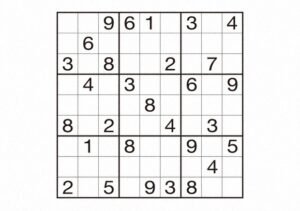SUDOKU was born in Japan and became a global sensation. Its popularity surged around 2005.

Launching of the Puzzle Magazine "Nikoli"
The prototype of SUDOKU, "Number place," was conceived in Switzerland in the 18th century and was popular in America. A Japanese man, Mr. Kaji, was fascinated by puzzles from the late 1970s. In 1980, he launched the puzzle magazine "Nikoli" and introduced "Number place", which was popular in America, to the Japanese audience with the name SUDOKU.
Meaning of SUDOKU
The "SU" in SUDOKU represents the Japanese word for numbers. The "DOKU" in SUDOKU comes from the Japanese word DOKUSHIN, meaning single (unmarried). When combined, SUDOKU essentially implies that numbers should always remain single.
SUDOKU Boom in the UK
In 2004, the British newspaper "The Times" featured SUDOKU, triggering a massive boom in the UK. In July 2005, a UK television station broadcasted a live SUDOKU program, further accelerating its popularity.
Impact of SUDOKU in Spain
In March 2006, the "First Spanish Sudoku Championship" was held in Madrid, the capital of Spain, with Mr. Kaji participating. It was notable that a Spanish journalist asked him, "What would you do if, because of SUDOKU, Spain's birth rate decreases?"
Current Status of SUDOKU
Sudoku continues to be enjoyed worldwide and is even listed in the Oxford English Dictionary as "Sudoku."
By the way, Mr. Kaji, the man credited with naming the number puzzle "SUDOKU", passed away on August 10, 2021. Despite this, SUDOKU remains beloved around the globe.